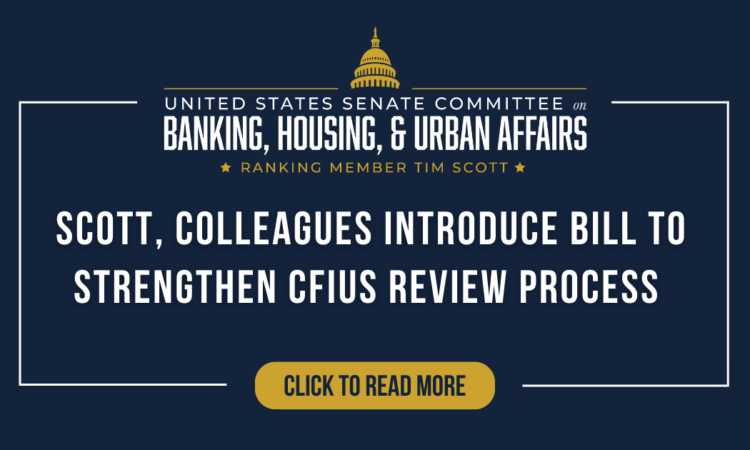
October 24, 2023
Washington, D.C. – Senator Tim Scott (R-S.C.), Ranking Member of the Senate Committee on Banking, Housing, and Urban Affairs, along with Senators Mike Crapo (R-Idaho), Steve Daines (R-Mont.), Mike Rounds (R-S.D.), Bill Hagerty (R-Tenn.), and Katie Britt (R-Ala.) today introduced the Protect Our Bases Act to ensure the Committee on Foreign Investment in the United States (CFIUS) can review foreign land purchases near sensitive military, intelligence, and national laboratory sites by requiring member agencies to annually update and review their lists of these sites.
“The Chinese Communist Party can’t be allowed to compromise the security of military and government facilities on our home turf,” said Ranking Member Scott. “By enhancing the review of foreign real estate transactions near sites that are vital to U.S. national security, this legislation will increase accountability to help ensure the Committee on Foreign Investment in the United States can take proper action to push back on Communist China and keep our nation safe.”
“Idaho is home to the world-renowned Idaho National Laboratory and military bases and installations responsible for research, development and training of critical national security importance. We must protect sensitive military and government sites from encroachment by foreign adversaries on our own land,” said Senator Crapo.
“As President Biden’s weakness on the world stage has emboldened our adversaries, we must take action to protect the United States from potential national security threats. Purchasing land around sensitive intelligence sites and national labs gives foreign nations increased ability to spy on the U.S.—it must be stopped,” said Senator Daines.
BACKGROUND
In 2022, Fufeng Group, a Chinese company with ties to the Chinese Communist Party, announced it would purchase land near Grand Forks Air Force Base in North Dakota. The Committee on Foreign Investment in the United States (CFIUS) determined that it could not evaluate the transaction for national security risks because the Department of Defense had not listed the base as a sensitive site for national security purposes. Although the City of Grand Forks ultimately blocked the transaction, the incident demonstrated a significant flaw in the review process of foreign land purchases. CFIUS relies on its member agencies to provide updated information on sensitive military, intelligence, and national laboratory sites in order to properly assess the security risk of foreign investment in our country. If CFIUS member agencies do not appropriately update their site lists, CFIUS cannot ensure an accurate review.
The Protect Our Bases Act requires agencies represented on CFIUS to provide updated records of the military, intelligence, and national laboratory facilities that should be sensitive sites for national security purposes to CFIUS on an annual basis. Additionally, the legislation requires CFIUS to submit an annual report to Congress certifying the completion of such reviews and the accuracy of its real estate listings.
The Protect Our Bases Act builds on Ranking Member Scott’s existing legislative work to safeguard America from malign foreign investments that pose national security concerns. Previously, the Ranking Member was an original cosponsor of the Foreign Investment Risk Review Modernization Act of 2018 (FIRRMA), a bill that reformed and updated the CFIUS review process, and helped ensure its inclusion in the Fiscal Year 2019 National Defense Authorization Act.
Read the bill text here.
###





